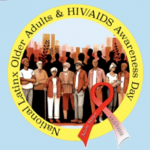Lillibeth Gonzalez, 65, celebrated her 28th “HIVersary” in early June by dancing in her New York City apartment and chatting with her son and her friends via Zoom. Having survived addiction, domestic violence and the AIDS-related deaths of three siblings, she is doing well today, but living with HIV for 28 years has taken its toll.
“There are days I wake up feeling well, and there are days I wake up feeling like I’m 90 years old,” she says. “The good part is that from zero [CD4] T cells, I was able to come up to 1,030, due to the medications. I’m healthy enough to work and exercise. When I feel good, I do as much as I can.”
As a long-term survivor, Gonzalez took older antiretroviral drugs with more side effects. One of them is abnormal body fat distribution, known as lipodystrophy. In particular, she has fat accumulation, known as lipohypertrophy. She struggles with a hard belly due to lipo as well as persistent gastrointestinal problems, arthritis and brain fog.
“This has changed my life in a terrible way,” Gonzalez says. “I used to model, so I was always a size 4 in clothing. But I saw my stomach growing and growing. The clothes that I liked didn’t fit me. I didn’t know how to shop for a size 10, 12 or even a 14. I got up to a size 14, but only because of my stomach. It’s the only thing that’s huge. My legs, hands and arms are slim.” But she doesn’t let that get her down.
“I look at myself in the mirror, and I say, ‘Oh my God! I’m getting old!’ I feel like I look like the man in Despicable Me, with the big stomach and the skinny legs,” says Gonzalez, who has worked as a community health educator at GMHC for 14 years, after starting out there as a client.
“I’ve come to just laugh about everything because I do not want to stress out,” she continues. “I’m happy to be 65 and alive. Aging is just something you have to deal with as it comes. My body reminds me every day that I’m getting old, but my mind is keeping me young.”
In addition to lifestyle changes, Gonzalez treated her lipo with the drug Egrifta (see “Understanding Lipodystrophy,” for more on treatment). “My doctor recommended Egrifta injections, but Medicaid did not approve them. I had to wait till I was over 65, when Medicare kicked in,” Gonzalez says. “Medicaid hardly approves anything, and it’s so difficult to find a doctor who accepts Medicaid. That’s why people are falling out of care, and it gets me very angry. I wish I could do something about this health system.”
“I took the shots for about six months, and it helped,” Gonzalez says. “This is a treatment that you must continue taking for the rest of your life, and I don’t know if I want to continue injecting my stomach for the rest of my life. My stomach was getting a little sore. So I changed my diet. People are telling me that my stomach has gone down. I exercise. I might ask my doctor to prescribe Egrifta again.”
In a follow-up interview on an episode of POZ at Home, a series of Zoom events that brings the HIV community together, Gonzalez confirmed that she is going on Egrifta SV, the new formulation that is easier to take.
Today, Gonzalez draws on her own experiences to help other people with HIV deal with the challenges of aging. “Helping others is what helps me,” she says.
“I’m on the long-term survivors page on Facebook. We discuss everything. I talk about my lipodystrophy and how I’ve managed it,” Gonzalez says. “I advise them to make sure they have a great rapport with their health care team. Look for what is best for you. You are the client.”
“What I can tell long-term survivors is that if we’ve come this far, we can continue living a healthy, happy life,” she continues. “What I offer them is to maintain a healthy mind, body and soul. It’s so important that you have a healthy spirit because your spirit is what’s going to lead you.”







Comments
Comments